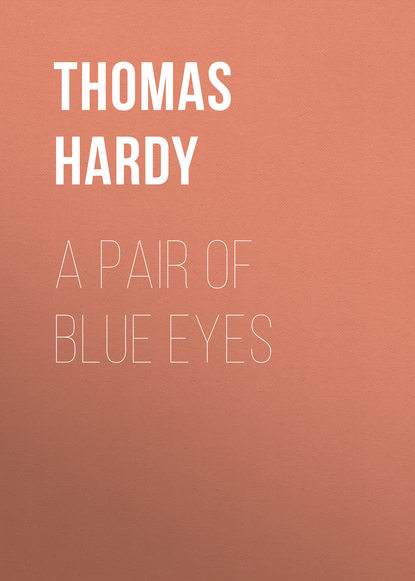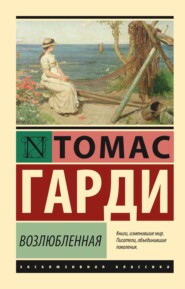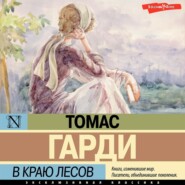По всем вопросам обращайтесь на: info@litportal.ru
(©) 2003-2025.
✖
A Pair of Blue Eyes
Настройки чтения
Размер шрифта
Высота строк
Поля
‘You know I have no such reason.’
‘And go on writing letters to the lady you are engaged to, just as before.’
‘What does that mean? I am not engaged.’
‘You wrote a letter to a Miss Somebody; I saw it in the letter-rack.’
‘Pooh! an elderly woman who keeps a stationer’s shop; and it was to tell her to keep my newspapers till I get back.’
‘You needn’t have explained: it was not my business at all.’ Miss Elfride was rather relieved to hear that statement, nevertheless. ‘And you won’t come again to see my father?’ she insisted.
‘I should like to – and to see you again, but – ’
‘Will you reveal to me that matter you hide?’ she interrupted petulantly.
‘No; not now.’
She could not but go on, graceless as it might seem.
‘Tell me this,’ she importuned with a trembling mouth. ‘Does any meeting of yours with a lady at Endelstow Vicarage clash with – any interest you may take in me?’
He started a little. ‘It does not,’ he said emphatically; and looked into the pupils of her eyes with the confidence that only honesty can give, and even that to youth alone.
The explanation had not come, but a gloom left her. She could not but believe that utterance. Whatever enigma might lie in the shadow on the blind, it was not an enigma of underhand passion.
She turned towards the house, entering it through the conservatory. Stephen went round to the front door. Mr. Swancourt was standing on the step in his slippers. Worm was adjusting a buckle in the harness, and murmuring about his poor head; and everything was ready for Stephen’s departure.
‘You named August for your visit. August it shall be; that is, if you care for the society of such a fossilized Tory,’ said Mr. Swancourt.
Mr. Smith only responded hesitatingly, that he should like to come again.
‘You said you would, and you must,’ insisted Elfride, coming to the door and speaking under her father’s arm.
Whatever reason the youth may have had for not wishing to enter the house as a guest, it no longer predominated. He promised, and bade them adieu, and got into the pony-carriage, which crept up the slope, and bore him out of their sight.
‘I never was so much taken with anybody in my life as I am with that young fellow – never! I cannot understand it – can’t understand it anyhow,’ said Mr. Swancourt quite energetically to himself; and went indoors.
Chapter VII
‘No more of me you knew, my love!’
Stephen Smith revisited Endelstow Vicarage, agreeably to his promise. He had a genuine artistic reason for coming, though no such reason seemed to be required. Six-and-thirty old seat ends, of exquisite fifteenth-century workmanship, were rapidly decaying in an aisle of the church; and it became politic to make drawings of their worm-eaten contours ere they were battered past recognition in the turmoil of the so-called restoration.
He entered the house at sunset, and the world was pleasant again to the two fair-haired ones. A momentary pang of disappointment had, nevertheless, passed through Elfride when she casually discovered that he had not come that minute post-haste from London, but had reached the neighbourhood the previous evening. Surprise would have accompanied the feeling, had she not remembered that several tourists were haunting the coast at this season, and that Stephen might have chosen to do likewise.
They did little besides chat that evening, Mr. Swancourt beginning to question his visitor, closely yet paternally, and in good part, on his hopes and prospects from the profession he had embraced. Stephen gave vague answers. The next day it rained. In the evening, when twenty-four hours of Elfride had completely rekindled her admirer’s ardour, a game of chess was proposed between them.
The game had its value in helping on the developments of their future.
Elfride soon perceived that her opponent was but a learner. She next noticed that he had a very odd way of handling the pieces when castling or taking a man. Antecedently she would have supposed that the same performance must be gone through by all players in the same manner; she was taught by his differing action that all ordinary players, who learn the game by sight, unconsciously touch the men in a stereotyped way. This impression of indescribable oddness in Stephen’s touch culminated in speech when she saw him, at the taking of one of her bishops, push it aside with the taking man instead of lifting it as a preliminary to the move.
‘How strangely you handle the men, Mr. Smith!’
‘Do I? I am sorry for that.’
‘Oh no – don’t be sorry; it is not a matter great enough for sorrow. But who taught you to play?’
‘Nobody, Miss Swancourt,’ he said. ‘I learnt from a book lent me by my friend Mr. Knight, the noblest man in the world.’
‘But you have seen people play?’
‘I have never seen the playing of a single game. This is the first time I ever had the opportunity of playing with a living opponent. I have worked out many games from books, and studied the reasons of the different moves, but that is all.’
This was a full explanation of his mannerism; but the fact that a man with the desire for chess should have grown up without being able to see or engage in a game astonished her not a little. She pondered on the circumstance for some time, looking into vacancy and hindering the play.
Mr. Swancourt was sitting with his eyes fixed on the board, but apparently thinking of other things. Half to himself he said, pending the move of Elfride:
‘“Quae finis aut quod me manet stipendium?”’
Stephen replied instantly:
‘“Effare: jussas cum fide poenas luam.”’
‘Excellent – prompt – gratifying!’ said Mr. Swancourt with feeling, bringing down his hand upon the table, and making three pawns and a knight dance over their borders by the shaking. ‘I was musing on those words as applicable to a strange course I am steering – but enough of that. I am delighted with you, Mr. Smith, for it is so seldom in this desert that I meet with a man who is gentleman and scholar enough to continue a quotation, however trite it may be.’
‘I also apply the words to myself,’ said Stephen quietly.
‘You? The last man in the world to do that, I should have thought.’
‘Come,’ murmured Elfride poutingly, and insinuating herself between them, ‘tell me all about it. Come, construe, construe!’
Stephen looked steadfastly into her face, and said slowly, and in a voice full of a far-off meaning that seemed quaintly premature in one so young:
‘Quae finis WHAT WILL BE THE END, aut OR, quod stipendium WHAT FINE, manet me AWAITS ME? Effare SPEAK OUT; luam I WILL PAY, cum fide WITH FAITH, jussas poenas THE PENALTY REQUIRED.’
The vicar, who had listened with a critical compression of the lips to this school-boy recitation, and by reason of his imperfect hearing had missed the marked realism of Stephen’s tone in the English words, now said hesitatingly: ‘By the bye, Mr. Smith (I know you’ll excuse my curiosity), though your translation was unexceptionably correct and close, you have a way of pronouncing your Latin which to me seems most peculiar. Not that the pronunciation of a dead language is of much importance; yet your accents and quantities have a grotesque sound to my ears. I thought first that you had acquired your way of breathing the vowels from some of the northern colleges; but it cannot be so with the quantities. What I was going to ask was, if your instructor in the classics could possibly have been an Oxford or Cambridge man?’
‘Yes; he was an Oxford man – Fellow of St. Cyprian’s.’
‘Really?’
‘Oh yes; there’s no doubt about it.
‘The oddest thing ever I heard of!’ said Mr. Swancourt, starting with astonishment. ‘That the pupil of such a man – ’
‘The best and cleverest man in England!’ cried Stephen enthusiastically.
‘That the pupil of such a man should pronounce Latin in the way you pronounce it beats all I ever heard. How long did he instruct you?’
‘And go on writing letters to the lady you are engaged to, just as before.’
‘What does that mean? I am not engaged.’
‘You wrote a letter to a Miss Somebody; I saw it in the letter-rack.’
‘Pooh! an elderly woman who keeps a stationer’s shop; and it was to tell her to keep my newspapers till I get back.’
‘You needn’t have explained: it was not my business at all.’ Miss Elfride was rather relieved to hear that statement, nevertheless. ‘And you won’t come again to see my father?’ she insisted.
‘I should like to – and to see you again, but – ’
‘Will you reveal to me that matter you hide?’ she interrupted petulantly.
‘No; not now.’
She could not but go on, graceless as it might seem.
‘Tell me this,’ she importuned with a trembling mouth. ‘Does any meeting of yours with a lady at Endelstow Vicarage clash with – any interest you may take in me?’
He started a little. ‘It does not,’ he said emphatically; and looked into the pupils of her eyes with the confidence that only honesty can give, and even that to youth alone.
The explanation had not come, but a gloom left her. She could not but believe that utterance. Whatever enigma might lie in the shadow on the blind, it was not an enigma of underhand passion.
She turned towards the house, entering it through the conservatory. Stephen went round to the front door. Mr. Swancourt was standing on the step in his slippers. Worm was adjusting a buckle in the harness, and murmuring about his poor head; and everything was ready for Stephen’s departure.
‘You named August for your visit. August it shall be; that is, if you care for the society of such a fossilized Tory,’ said Mr. Swancourt.
Mr. Smith only responded hesitatingly, that he should like to come again.
‘You said you would, and you must,’ insisted Elfride, coming to the door and speaking under her father’s arm.
Whatever reason the youth may have had for not wishing to enter the house as a guest, it no longer predominated. He promised, and bade them adieu, and got into the pony-carriage, which crept up the slope, and bore him out of their sight.
‘I never was so much taken with anybody in my life as I am with that young fellow – never! I cannot understand it – can’t understand it anyhow,’ said Mr. Swancourt quite energetically to himself; and went indoors.
Chapter VII
‘No more of me you knew, my love!’
Stephen Smith revisited Endelstow Vicarage, agreeably to his promise. He had a genuine artistic reason for coming, though no such reason seemed to be required. Six-and-thirty old seat ends, of exquisite fifteenth-century workmanship, were rapidly decaying in an aisle of the church; and it became politic to make drawings of their worm-eaten contours ere they were battered past recognition in the turmoil of the so-called restoration.
He entered the house at sunset, and the world was pleasant again to the two fair-haired ones. A momentary pang of disappointment had, nevertheless, passed through Elfride when she casually discovered that he had not come that minute post-haste from London, but had reached the neighbourhood the previous evening. Surprise would have accompanied the feeling, had she not remembered that several tourists were haunting the coast at this season, and that Stephen might have chosen to do likewise.
They did little besides chat that evening, Mr. Swancourt beginning to question his visitor, closely yet paternally, and in good part, on his hopes and prospects from the profession he had embraced. Stephen gave vague answers. The next day it rained. In the evening, when twenty-four hours of Elfride had completely rekindled her admirer’s ardour, a game of chess was proposed between them.
The game had its value in helping on the developments of their future.
Elfride soon perceived that her opponent was but a learner. She next noticed that he had a very odd way of handling the pieces when castling or taking a man. Antecedently she would have supposed that the same performance must be gone through by all players in the same manner; she was taught by his differing action that all ordinary players, who learn the game by sight, unconsciously touch the men in a stereotyped way. This impression of indescribable oddness in Stephen’s touch culminated in speech when she saw him, at the taking of one of her bishops, push it aside with the taking man instead of lifting it as a preliminary to the move.
‘How strangely you handle the men, Mr. Smith!’
‘Do I? I am sorry for that.’
‘Oh no – don’t be sorry; it is not a matter great enough for sorrow. But who taught you to play?’
‘Nobody, Miss Swancourt,’ he said. ‘I learnt from a book lent me by my friend Mr. Knight, the noblest man in the world.’
‘But you have seen people play?’
‘I have never seen the playing of a single game. This is the first time I ever had the opportunity of playing with a living opponent. I have worked out many games from books, and studied the reasons of the different moves, but that is all.’
This was a full explanation of his mannerism; but the fact that a man with the desire for chess should have grown up without being able to see or engage in a game astonished her not a little. She pondered on the circumstance for some time, looking into vacancy and hindering the play.
Mr. Swancourt was sitting with his eyes fixed on the board, but apparently thinking of other things. Half to himself he said, pending the move of Elfride:
‘“Quae finis aut quod me manet stipendium?”’
Stephen replied instantly:
‘“Effare: jussas cum fide poenas luam.”’
‘Excellent – prompt – gratifying!’ said Mr. Swancourt with feeling, bringing down his hand upon the table, and making three pawns and a knight dance over their borders by the shaking. ‘I was musing on those words as applicable to a strange course I am steering – but enough of that. I am delighted with you, Mr. Smith, for it is so seldom in this desert that I meet with a man who is gentleman and scholar enough to continue a quotation, however trite it may be.’
‘I also apply the words to myself,’ said Stephen quietly.
‘You? The last man in the world to do that, I should have thought.’
‘Come,’ murmured Elfride poutingly, and insinuating herself between them, ‘tell me all about it. Come, construe, construe!’
Stephen looked steadfastly into her face, and said slowly, and in a voice full of a far-off meaning that seemed quaintly premature in one so young:
‘Quae finis WHAT WILL BE THE END, aut OR, quod stipendium WHAT FINE, manet me AWAITS ME? Effare SPEAK OUT; luam I WILL PAY, cum fide WITH FAITH, jussas poenas THE PENALTY REQUIRED.’
The vicar, who had listened with a critical compression of the lips to this school-boy recitation, and by reason of his imperfect hearing had missed the marked realism of Stephen’s tone in the English words, now said hesitatingly: ‘By the bye, Mr. Smith (I know you’ll excuse my curiosity), though your translation was unexceptionably correct and close, you have a way of pronouncing your Latin which to me seems most peculiar. Not that the pronunciation of a dead language is of much importance; yet your accents and quantities have a grotesque sound to my ears. I thought first that you had acquired your way of breathing the vowels from some of the northern colleges; but it cannot be so with the quantities. What I was going to ask was, if your instructor in the classics could possibly have been an Oxford or Cambridge man?’
‘Yes; he was an Oxford man – Fellow of St. Cyprian’s.’
‘Really?’
‘Oh yes; there’s no doubt about it.
‘The oddest thing ever I heard of!’ said Mr. Swancourt, starting with astonishment. ‘That the pupil of such a man – ’
‘The best and cleverest man in England!’ cried Stephen enthusiastically.
‘That the pupil of such a man should pronounce Latin in the way you pronounce it beats all I ever heard. How long did he instruct you?’

















